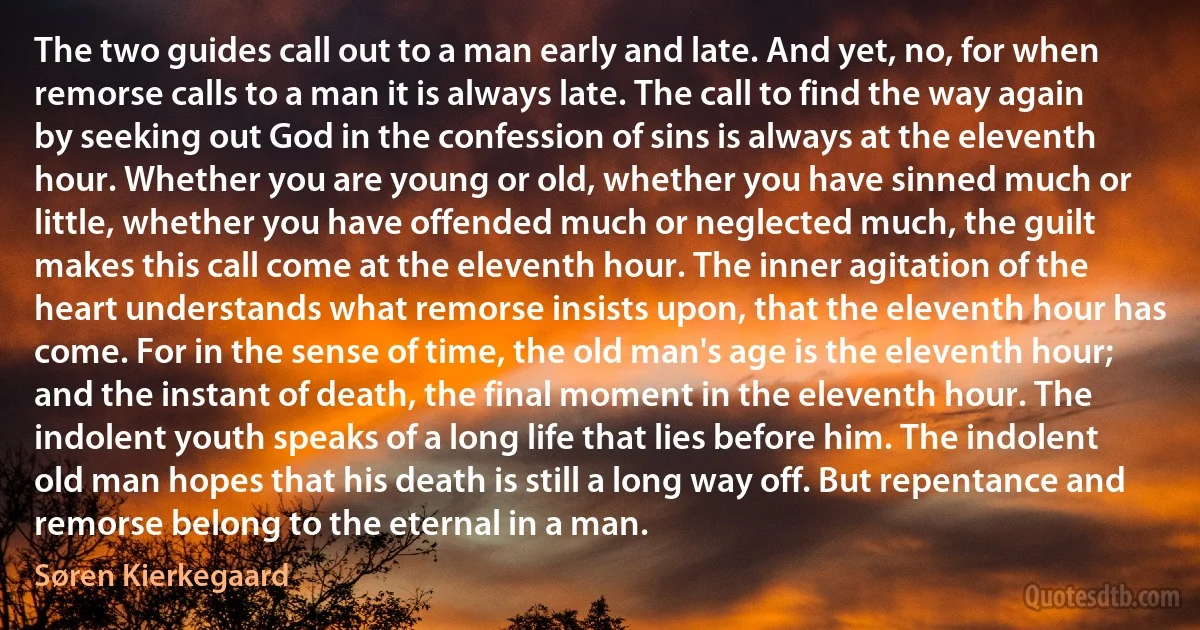
The two guides call out to a man early and late. And yet, no, for when remorse calls to a man it is always late. The call to find the way again by seeking out God in the confession of sins is always at the eleventh hour. Whether you are young or old, whether you have sinned much or little, whether you have offended much or neglected much, the guilt makes this call come at the eleventh hour. The inner agitation of the heart understands what remorse insists upon, that the eleventh hour has come. For in the sense of time, the old man's age is the eleventh hour; and the instant of death, the final moment in the eleventh hour. The indolent youth speaks of a long life that lies before him. The indolent old man hopes that his death is still a long way off. But repentance and remorse belong to the eternal in a man.
Søren KierkegaardRelated topics
age call death early final find guilt heart hour late life man moment off repentance seeking sense sin time way yet young youth liesRelated quotes
By this sinister elision, this slipping from true remorse, the belief that the suffering we have precipitated ought to ennoble us, or at least make us less ignoble from then on, to disguised self-forgiveness, the belief that suffering in some way ennobles life, so that the precipitation of pain comes, by such a cockneyed algebra, to equal the ennoblement, or at any rate the enrichment, of life, by this characteristically twentieth-century retreat from content into form, from meaning into appearance, from ethics into aesthetics, from aqua into unda, I dulled the pain of that accusing death; and hardened myself, to say nothing of it at Bourani. I was still determined to tell Julie, but at the right time and place, when the exchange rate between confession and the sympathy it evoked looked very likely to be high.

John Fowles
It is just that, in so terrible a day, and in the last moments of my life, I should discover all the iniquity of falsehood, and make the truth triumph. I declare, then, in the face of heaven and earth, and acknowledge, though to my eternal shame, that I have committed the greatest crimes but it has been the acknowledging of those which have been so foully charged on the order. I attest - and truth obliges me to attest - that it is innocent! I made the contrary declaration only to suspend the excessive pains of torture, and to mollify those who made me endure them. I know the punishments which have been inflicted on all the knights who had the courage to revoke a similar confession; but the dreadful spectacle which is presented to me is not able to make me confirm one lie by another. The life offered me on such infamous terms I abandon without regret.

Jacques de Molay
Pleasure, the outer edge of ecstasy, was in the dour days of Protestantism, considered sinful in itself, wherever gained; Rome held specifically that any or all sexual pleasure was sinful. And for all this capped volcano produced in terms of bridges and houses, factories and bombs, it gouted from its riven sides a frightful harvest of neurosis. And even where a nation officially discarded the church, the same repressive techniques remained, the same preoccupation with doctrine, filtered through the same mesh of guilt. So sex and religion, the real meaning of human existence, ceased to be meaning and became means; the unbridgeable hostility between the final combatants was the proof of the identity of their aim-the total domination, for the ultimate satisfaction of the will to superiority, of all human minds.

Theodore Sturgeon
I am told that there are still left over 18,000 Hindus and Sikhs in Rawalpindi and 30,000 in the Wah Camp. I will repeat my advice that they should all be prepared to die rather than leave their homes. The art of dying bravely and with honour does not need any special training, save a living faith in God. Then there will be no abductions and no forcible conversions. I know that you are anxious I should go to the Punjab at the earliest moment. I want to do so. But if I failed in Delhi, it is impossible for me to succeed in Pakistan. For I want to go to all the parts and provinces of Pakistan under the protection of no escort save God. I will go as a friend of the Muslims as of others. My life will be at their disposal. I hope that I may cheerfully die at the hands of anyone who chooses to take my life. Then I will have done as I have advised all to do.

Mahatma Gandhi
I reproach myself for a gross error. But I would reproach myself more if I had persisted in an error after observations revealed it clearly to be that. I made a deal of money in the late 1940s on the bull side, ignoring Satchel Paige's advice to Lot's wife, "Never look back.” Rather I would advocate Samuelson's Law: "Always look back. You may learn something from your residuals. Usually one's forecasts are not so good as one remembers them; the difference may be instructive.” The dictum "If you must forecast, forecast often,” is neither a joke nor a confession of impotence. It is a recognition of the primacy of brute fact over pretty theory. That part of the future that cannot be related to the present's past is precisely what science cannot hope to capture. Fortunately, there is plenty of work for science to do, plenty of scientific tasks not yet done.

Paul Samuelson
